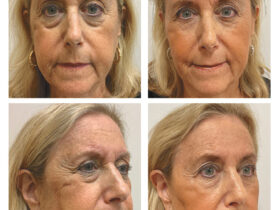There are multiple forms of hernias, but two common types are inguinal and ventral.
A ventral hernia is a protrusion in the abdomen caused by a weak spot in the muscle fibers. The protrusion is usually an organ or the intestines that jut through the abdominal wall, causing a bulge that is often times noticeable to the naked eye.
By Mark A. Liberman, M.D., F.A.C.S.
 Ventral hernias are sometimes painful and can cause discomfort when straining, coughing or moving. In advanced cases, the patient may experience nausea and vomiting.
Ventral hernias are sometimes painful and can cause discomfort when straining, coughing or moving. In advanced cases, the patient may experience nausea and vomiting.
A ventral hernia usually must be taken care of
surgically, as they normally do not heal on their own. Surgery is necessary to prevent strangulation, or a cutting off of blood flow to the organ that’s in jeopardy, as this is a life-threatening situation.
Ventral hernias are usually the result of some previous abdominal surgery, or pregnancy, or possibly even a congenital defect that causes weakness in the tissue fibers and allows the organ, or hernia sac to protrude.
The good news is that a ventral hernia can be easily repaired via an open or laparoscopic technique. Both have their pros and cons. A surgeon will perform the procedure through a laparoscopic technique. This laparoscopic method is achieved by way of a small incision in the belly button and through another very tiny port (incision). The surgeon will then put the organ or intestines back into place and secure it there with a flexible mesh patch. The laparoscopic method is minimally invasive, and the healing time may be less than with a typical open abdominal surgery.
In certain instances, when ventral hernias become imminently dangerous, or are in a difficult spot that may be hidden, tangled or not easily accessible, a surgeon will have to do the procedure with an open abdominal surgical procedure. The same outcome is achieved by placing the mesh panel to alleviate the protrusion, although, the healing time will be a few weeks longer than with the minimally invasive
procedure.
An inguinal hernia is in the groin area and even though it is more common in men, it can affect both male and female patients of all ages. The inguinal hernia is typically a weakening of the fascia fibers allowing the intestines to bulge and push through.
A congenital weakening of the abdominal wall at birth, or deterioration from the aging process can cause an inguinal hernia. It can also be exacerbated by strenuous activity, pregnancy and staining during bowel movements.
The inguinal hernia may be repaired via an open or laparoscopic technique. The laparoscopic procedure is through the belly button, where the bulge is pushed back into place, or removed, and then sutures or a mesh panel is secured to prevent future hernias.
At Liberman Advanced Surgical, Dr. Mark Liberman was fellowship trained in Advanced Laparoscopic Surgery at Cedars-Sinai, Los Angeles in 1995, Dr. Liberman has been delivering state of the art laparoscopic, hernia repair, breast cancer and bariatric surgical care for 20 years. Recruited from San Diego by The Cleveland Clinic, Dr. Mark Liberman has been providing world-class care in Naples for the past 16 years.
To find out more information on Dr. Liberman, his advanced surgery office, or their procedures, please visit LibermanAdvancedSurgical.com or call to make your appointment at (239) 348-4123.
Mark A. Liberman, M.D., F.A.C.S.
6101 Pine Ridge Rd, Naples FL 34119
239-348-4123
Castle Connolly Top Doctor-as Chosen by Peers
2004-2016
LIBERMANADVANCEDSURGICAL.COM









